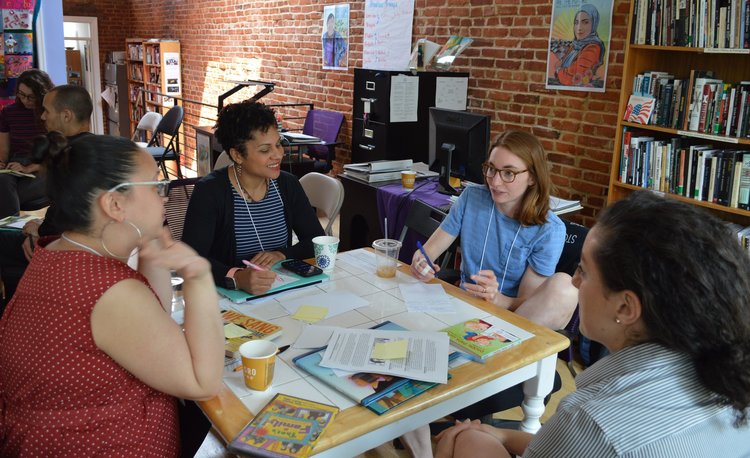Working Groups
D.C. Area Educators for Social Justice (DCAESJ) is a network of educators who seek to strengthen and deepen social justice teaching. We are a community of mutual support for educators to collaborate on curriculum, professional learning, and activism. We challenge systems of oppression through anti-bias, anti-racist, and multicultural education. We work with students, families, and other educators in and outside of our classrooms to create a more just and equitable world.
Working groups are an intentional learning community for K-12 social justice educators in the D.C. metro area. The working groups provide experienced social justice educators an opportunity to deepen practice, gain moral support from peers, and engage in writing for publication or workshop development to share lessons or teaching stories.
Working groups:
meet monthly and play an active role in DC Area Educators for Social Justice (DCAESJ) events, such as Indigenous Peoples’ Day, Teach Central America Week, and Black Lives Matter at School Week of Action and Year of Purpose
applications are considered on a rolling basis
membership is for at minimum one school year
membership size are approximately 25 - 50 educators
are co-facilitated by two teacher leaders who support the agenda creation and monthly convenings of working groups
have a small advisory of educators who serve alongside the teacher leaders and meet as needed
Join a Working Group
Anti-Bias Early Childhood Working Group
A working group for D.C. area early childhood (birth to 8-years-old) teachers experienced in and committed to anti-bias education.
Elementary Working Group
A working group for D.C. area elementary (3rd - 5th grade) educators committed to social justice and anti-racist pedagogy.
Past Working Groups
Black Lives Matter Week of Action in Schools
D.C. Area Educators for Social Justice, Center for Inspired Teaching, the Washington Teachers’ Union, and many more D.C. area educators and organizations planned the Black Lives Matter at School Week of Action as part of a national campaign.
The goal of the Black Lives Matter at School Week of Action is to spark an ongoing movement of critical reflection and honest conversations in school communities for people of all ages to engage with critical issues of social justice. The 13 guiding principles of the Black Lives Matter movement are highlighted during the week of action as a means of challenging the insidious legacy of institutionalized racism and oppression that has plagued the U.S. since its founding. Each day teachers explore two to three of the Black Lives Matter movement thirteen guiding principles. The working group met during the 2018-2019 school year to screen and develop lessons and activities for D.C. area classrooms. The results of the committee’s work is reflected in the Black Lives Matter at Schools Week of Action section of the DCAESJ website.
Central America Curriculum Group
This working group collaborated to create and identify resources that incorporate the history, literature, and culture of Central American peoples into the curriculum of DC area schools. Together they field tested lessons; heard from experts from local colleges and universities about Central America; screened documentaries and discussed how they can be used in the classroom; read literature and poetry written by or about Central American history and culture, and discussed how they can be used in the classroom; and shared resources. The Teaching Central America website includes lessons developed by members of the working group.
Stories from our Classrooms
Stories from Our Classrooms is a two credit graduate course for classroom teachers, in all subject areas and from all grade levels, to give voice to their authentic classroom experiences.
As a result of learning, writing, and reflecting together, the teacher participants deepen their own practice, build community among D.C. area social justice educators, and contribute to the all too scarce collection of published descriptions of classroom practice by classroom teachers themselves.
The participants are coached through a variety of writing exercises and provide one another ongoing feedback through peer response groups. Each participant writes and revises a story with the specific goal of publication. In addition, guest authors and editors attend some sessions to share insights and experiences related to publication. Applications will be posted in the spring of 2020 for the 2020-2021 school year course.







